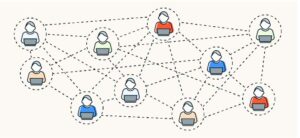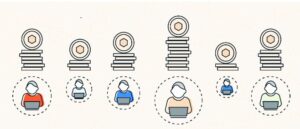What Is A DAO Complete Guide will be described in this article. A decentralized independent organization (DAO) is an entity in which all partners participate in decision-making, because there is no central authority. While DAOs are often underpinned by blockchain technology and generally secure, all online activity comes with some risks. Learn more about DAOs, including their benefits and drawbacks. Then, get an all-in-one security and privacy app to protect your digital life.
What Is A Decentralized Autonomous Organization (DAO)?
In this article, you can know about What Is A DAO here are the details below;
What is the meaning of DAO?
DAO (pronounced “dow”) means decentralized autonomous organization. A DAO decentralizes management processes by using smart contracts and giving each member of an organization a vote in how it’s run. All voices are recorded on the blockchain, providing transparency. DAOs are often mentioned in the cryptocurrency context, but many different types of organizations may operate as DAOs in the future.
Another name for a DAO is a DAC (decentralized autonomous corporations). And both of these organization types are different from distributed autonomous organizations, despite the similarities in the name.
How does a DAO work?
A DAO replaces the central authority of an organization with rules encoded in smart contracts that are stored on the blockchain. Instead of a manager or executive board making decisions, a DAO works based on the consensus of its members, who vote on the details of the contracts.
Smart contracts can be proposed and written by anyone who participates in the DAO. For example, someone might want to change the rules of the DAO, and someone else might have an idea on how to best spend the DAO’s funds.
Once a smart contract is drawn up, it becomes visible to all members on the block chain. Members then vote — which is also a fully transparent process — on the smart contract. The DAO will only execute the smart contract if consensus is reached among members.
The mechanics of a DAO involve complex cryptography and computer coding. DAOs are also a major part of web3 and the metaverse.
A DAO distributes decision-making to each member of an organization or community.A DAO distributes decision-making throughout an organization or community.

Components of a DAO
There are three basic components that are critical to DAO when it’s based on a blockchain:
Smart contracts
Smart contracts are self-executing agreements encoded on a blockchain. Smart contracts are similar to standard contractual agreements that you sign on paper, but when encoded on a blockchain, they’re impossible to break without the consensus of the parties involved.
Smart contracts automate and streamline decision-making by removing the need for a middleman. In a DAO, smart contracts contain the rules and describe operating conditions such as decision-making processes, fund allocation, and member interactions.
Tokens
Tokens are digital assets used to represent ownership and membership in a DAO, similar to owning shares of a company. In the context of a DAO, tokens commonly come in the form of cryptocurrency like Ethereum.
Tokens can be traded on cryptocurrency businesses and held in crypto wallets. By owning tokens of a particular DAO, members can participate in the management process and receive a share of the DAO’s profits. Owning one token is enough to participate in the DAO, but owning more will increase your decision-making power. Depending on the duration of the smart contract that undergirds a DAO, a member with 200 tokens may twice the voting power as a member with 100 tokens. Also check How To Fix Fatal Error
Tokens are digital support that represent ownership and membership in a DAO.Tokens are digital assets that represent membership in a DAO. A member’s voting power is often proportional to their share of tokens.

No centralized legal entity (decentralization)
There is no human organization or authority involved in the management of a DAO. A DAO operates on its own so no individual member can interfere with the decision-making process. DAOs can only operate based on the contents of the smart contracts, which all members vote on. That makes a DAO more democratic and, in theory, less likely to be corrupted than a conventional, centralized organization.
How is a DAO launched?
Launching a digital DAO is a lot more complicated than drawing up a contract on paper. In order to automate and enforce smart contracts globally, an entire digital infrastructure needs to be built, funded, and deployed on a blockchain. Below are the three essential steps needed to launch a DAO online:
Smart contract creation
To create a smart contract, a developer (or group of developers) creates one (or more) smart contract that will govern the DAO. The smart contract contains the rules and conditions defining how the DAO will operate when it comes to decision-making, voting, and token distribution.
Funding
Once the smart contract is created, the DAO needs to raise funding. This is typically done through the sale of tokens, which represent ownership or membership in the DAO. Members can buy and sell these tokens on cryptocurrency exchanges, and the tokens can be used to vote on proposals and decisions within the DAO.
Deployment
After the smart contract is complete and funding secured, the DAO is deployed on the blockchain. This is when the DAO goes “live.” Stakeholders can now participate in the DAO, vote on proposals, & make conclusions about the future of the organization.
Advantages of decentralized autonomous organizations
DAOs give organizations the opportunity to digitize their management structure, which has several benefits. Here are a few:
Decentralization
Unlike traditional businesses and organizations, no one is in charge of a DAO. It organizes and executes all decisions without a human authority. All members of a DAO vote on all decisions, and the smart contract executes the decisions automatically. Because a DAO is transparent, all members likely share a common interest in its success. So, equitable decision-making helps the community to thrive without the pitfalls of a traditional organization.
Participation
Anyone who owns a token in the DAO can participate. This motivates each member to engage in the community and have their say. The more members who participate, the more successful the DAO is — especially if the DAO’s aim is community growth. An example might be a social network managed by a DAO. The decentralized structure could allow token holders to propose and vote on new features.
Transparency
When members can see what everyone else is doing within a DAO, the system’s integrity remains intact. All actions in the DAO — including voting — are public. This ensures that all members are held accountable. Bad actors are unlikely to crop up because their actions are instantly visible to the rest of the members. Transparency builds trust in the DAO and ensures that the organization continues to operate in the best interest of its participants.
Community
DAOs bring together people from all over who share a common interest or goal. This can build a sense of community in, say, a social network. Or, it can easily gather like-minded experts for a niche pursuit. A shared connection and a guarantee of equitable results encourage members to engage in the DAO and increase its chance of success.
Disadvantages of decentralized autonomous organizations
DAOs are a relatively new concept and are not without their drawbacks. Here are some of the current downsides or limitations of DAOs:
Speed
DAOs require input from all individuals in the organization, which can lead to longer voting periods and slower decision-making. A DAO may take longer to implement a new feature or change due to the need for extensive voting and consensus-building among token holders.
Education
DAOs allow all members to have a say, but some decision-makers may not have the proper background or knowledge on a topic. With varying levels of education and experience, a DAO can suffer from poor decision-making due to a lack of expertise.
Inefficiency
Democratic management is usually slower than centralized, top-down decision-making. Because of the need to build consensus — and potentially educate members along the way — DAOs can be less efficient than centralized organizations. In a DAO, everyone has a say, which may cause inefficiencies in coordination and decision-making.
Security
While a blockchain ensures confidentiality by encrypting interactions, security is still a concern for DAOs. Individual members can always be targeted by malware, phishing attacks, and other scams.
And being run on a digital platform, DAOs are vulnerable to hacking and other forms of cybercrime. For example, a project called TEMPLE fell victim to a DAO hack in 2022. Over $2 million in cryptocurrency was lost before their app was taken offline. A DAO must ensure it has the technical expertise necessary to implement and maintain it. Also check Why hire a security company
Secure your online activity
DAOs offer many advantages, but the digital platforms used by their members can still have weaknesses. Whether you’re considering participating in a DAO or just going about your daily business online, protect yourself from digital threats with dedicated security software.
Avast One is your all-in-one digital guardian, featuring industry-leading antivirus detection along with powerful privacy and performance tools like a built-in VPN. Install Avast One today — completely free — for ironclad online protection.
Decentralized autonomous organization FAQs
What is a DAO?
DAO stands for decentralized autonomous organization. A DAO is a type of digital management structure governed by smart contracts with decisions recorded on a blockchain. Members of a DAO vote on the details of the smart contracts that define how the DAO operates.
Cryptocurrency, NFTs, and other blockchain-based businesses are DAOs, but any type of organization can decentralize by operating as a DAO.
How is a DAO run?
A DAO is organized through a managerial process voting authority and decision-making to all its members. Each member of a DAO can propose decisions and vote on them, ultimately creating smart contracts visible on the blockchain. These contracts contain the DAO’s rules. To be a member — and therefore, co-manager — of a DAO, you have to own the DAO’s specific token.
What is an example of a DAO?
A real DAO example is Decentraland, a 3D digital world run entirely by its members. Users can make avatars, buy real estate, and even start a business. Anyone who owns the DAO’s cryptocurrency token, MANA, can take part in the management of the platform — there is no centralized authority. Major businesses such as Coca-Cola and Adidas participate in this DAO.



